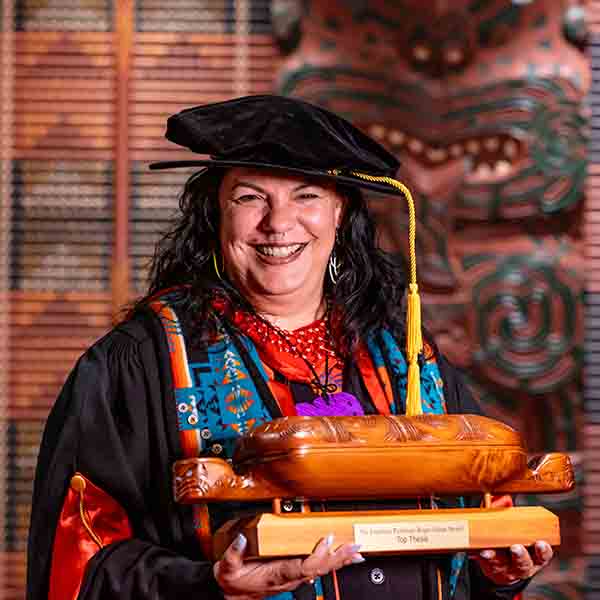International PhD Alumnus Paving the Way for Indigenous Academics
Te Whare Wānanga o Awanuiārangi’s international PhD alumnus, Dr. Dawn Barron is the Director of the Native Pathways Programme and Creative Writing Faculty at The Evergreen State College in Washington DC and has dedicated her career to amplifying Indigenous voices and fostering connections between identity, culture, and education.
Dr. Barron’s family and ancestors are from the Indigenous lands of what is now Northen Mexico, Chihuahua, and the Southeastern United States, as well as from Ireland’s Mayo County, western Scotland, and Germanic Europe. She explains how this provides an interesting mix, and some common themes, of culture and identity.
“My culture is not monolithic because I come from what most would say are vastly different peoples. Despite these differences, a common thread runs through my lineage: resilience, innovation, and the determination to survive. Both my Indigenous and European ancestors were, in their own ways, nomadic, always in pursuit of sustenance, family, love, and work as they sought to find their sense of 'home’.”
Dr Barron won this year's top thesis award that dives deep into the complexities of identity politics within institutions of higher learning. She explains, “My research explores the nuanced relationships between social, cultural, and political identities, how this affects Indigenous students’ learning, and whether identity politics supports or challenges indigeneity in higher education.
“I was beyond honored and thrilled to receive the top thesis award, also a smidge tongue-tied, which is not an affliction I often encounter! The experience made the entire journey of earning my doctorate feel much more tangible.
“It was a powerful reminder of the potential that both storytelling and academia hold, especially when approached through an Indigenous lens. It affirmed for me that when we center Indigenous perspectives, we honor our past while creating pathways for the future."
She shares what inspired her decision to pursue a PhD. “I can never escape my grandmother’s (1908-2007) words: “Nobody can take your education away. They can take your job, your life, and many other things, but not your education.”
“I knew that I wanted to include poetics and visual literacy components in the thesis, just as I knew I wanted to work with Indigenous folks and not simply fall into the western academy trap.
”During a weekend study on Lummi Nation lands, I had the opportunity to meet the team from Awanuiārangi. It was perfect timing, as I was searching for a doctoral program that aligned with my values and research interests.
“I had been feeling frustrated by the rigidity and limitations of other institutions—until I connected with Professor Wiremu Doherty and, later, the incomparable Professor Mera Penehira. I fell in love with the authenticity and cultural focus of the Wānanga, that’s when I knew I had found the ideal place to call home for my next few years of study.”
Dr. Barron’s work at Evergreen College is paving the way for emerging academics and community leaders, creating spaces where Indigenous scholars can thrive.
“Learning is life-long and fluid, so to gain full access to information, being welcoming and supportive of younger, emerging academics, as well as community teachers is vital to having a well-rounded and multi-perspective learning environment.
“Practicing deep listening to new (and old) ideas generates a more equitable learning practice, and for this to occur, people not already “at the table” need to be sought out, supported, and included in meaningful ways.”
Before embarking on her PhD journey, Dawn was already an accomplished and published poet.
“My cultural background and lived experiences have shaped everything that I write creatively. I am constantly examining identity, belonging, loss, love, betrayal, and the role of the outsider or outlier in my poetics, fiction, and creative non-fiction.
“I am also most interested in exploring racism and sexism through the lens of classism in my work, which is directly a result of who I am as a person, and how I am perceived. Poetics impacts my academic work by making me consider word choices, imagery through language, how to incorporate metaphor and analogy, and above all, how to be a compelling storyteller—for that is what all academic work is—a story of some kind.”
